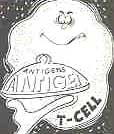Hyping up proteins
 The immune system responds to invasion by foreign substances in two ways ' One kind of reaction is the release of soluble antibodies by the B cells found in the lymphatic system, which can release soluble antibodies -to bind and immobilise alien molecules in the circulation, T cells on the other hand could also deal with invaders with the help of surface receptors anchored on their membranes. However, for a T cell to recognise a foreign antigen, it has to be first taken up by some other cell and then 'presented', as it were, by that cell to the T cell.
The immune system responds to invasion by foreign substances in two ways ' One kind of reaction is the release of soluble antibodies by the B cells found in the lymphatic system, which can release soluble antibodies -to bind and immobilise alien molecules in the circulation, T cells on the other hand could also deal with invaders with the help of surface receptors anchored on their membranes. However, for a T cell to recognise a foreign antigen, it has to be first taken up by some other cell and then 'presented', as it were, by that cell to the T cell.
Recently, S Rath and his colleagues in the National Institute of Immunology Delhi, have pioneered a new approach to the generation of an immune response without the use of adjuvants, the latter being a mixture of substances used to enhance immunogeneticity (Journal of lmmunology, 154: 1-8).
Since proteins are not particularly efficient at eliciting a response from the body's immune system' they need adjuvants. Rath's team made use of the properties of a reactor on the surface of macrophages, the scavenger cells which internalise molecules that bind cell-surface receptors and 'present' them to the T cells.
It was known that a specific form of chemical modification, known as maleylation, could convert many proteins into a form recognisable by scavenger cells. Rath's team showed that the same trick, when used with protein antigens, makes the maleylated proteins act as their own adjuvants.
Interestingly, maleylation affected the specificity of the response by B cells (which generate circulating anti- bodies) but not that by T cells (which are the cellulary mediators of the immune response). Experts refer to this as a split identity between the normal and maleylated forms of the protein.
Hitherto, among the main candidates for presenting exogenous antigens to T cells, only B cells have been studied in detail with respect to their ability to internalise antigens via specific surface receptors. This study shows that an alternative, macrophae-mediated delivery of antigen is also feasible after chemically modifying the antigen. These results are exciting from the point of view of designing vaccines against parasites. Many parasites remain inside cells and so do not elicit a humoral immune response, but remain potentially targetable by T cells.
